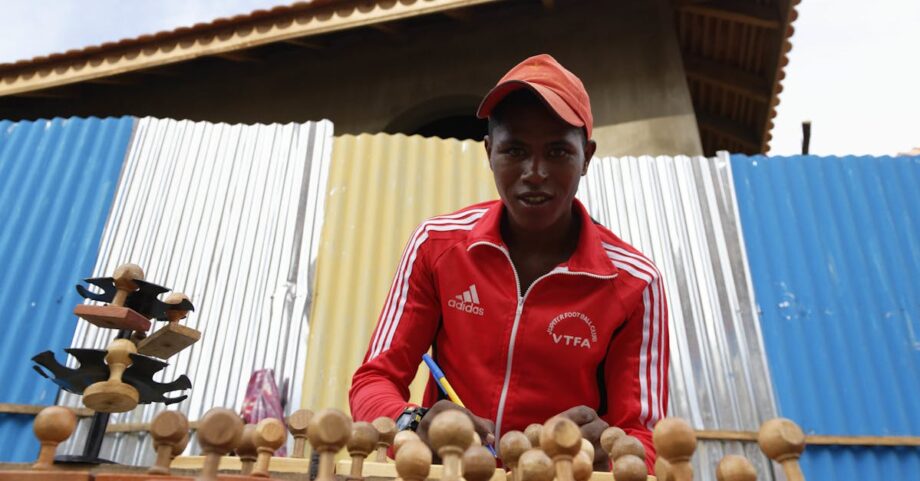[music]
-Hello, and welcome to the International Labour Organization’s
Future of Work podcast.
I’m Anders Johnson coming to you from Abidjan in Côte d’Ivoire,
here to talk about and celebrate the World Day for Social Justice.
This International Day is observed every 20th of February
to focus attention on the urgent need
to strengthen social justice around the world,
which includes efforts to tackle issues such as poverty,
exclusion and inequality, unemployment, or a lack of social protections,
all of which are challenges here in Africa.
Now, one of the things that makes this continent so unique
is the age of its people,
and, no, I’m not referring to the fact
that Africa is the cradle of human civilization.
Instead, what I want to draw attention to is the fact
that half the continent’s population is 19 years old or younger,
and with a quarter
of the world’s population expected to be African by 2050,
I think it’s fair to say that if the world is to achieve social justice,
that will depend, in a large part,
on achieving social justice for Africa’s youth.
To unpack this issue, I’m joined today by Jonas Bausch,
the ILO’s Regional Youth Employment Specialist for Africa.
But first, based on the principle that “nothing about us without us,”
I’m pleased to introduce two amazing guests,
both young Africans doing their part
to advance social justice for their fellow youth,
Botshelo Mpho joining us from South Africa and Mulombe Chisoti from Zambia.
Botshelo, Mulombe, welcome to the Future of Work podcast.
-Thank you for having me. -Thank you for having us.
-First, tell me a little bit about yourself,
and when you think of the term “social justice,”
what does it mean to you?
-I’m from South Africa, the province of Limpopo,
and a little village in Limpopo called Lenyenye.
I’m an honours student.
I’m yet to graduate in the undergrad degree,
Bachelor of Theology, this April.
When I think about social justice,
the two words that pop up in my mind are “social development,”
and I have three terms that I instantly think about.
It’s education, government, and religion.
Education in terms of quality education that advances the lives of the youth
that are getting this education.
When I think about government,
is the government putting in place the structures
that could develop the social structures of the world or rather South Africa?
To focus on South Africa, and religion specifically
because the society in most places is shaped by religion.
-Thank you so much.
My name is Mulombe
and I am a student at University of Lusaka.
Social justice means ensuring all individuals have equal rights
and access to opportunities regardless of their race,
regardless of their gender, their background.
It also means standing up against discrimination
and injustice in our communities, in our countries,
and regions.
-How do you see that link between decent work and social justice?
Is it the same thing for you
or your classmates or are they distinct issues?
-Decent employment includes having job security,
having a proper salary, and working proper hours.
Not overworked and underpaid.
Decent employment is part of social justice
and it’s part of achieving social justice.
-Let me ask you, how important is social justice to you or your friend,
# Bridging the Gap: A Conversation about Social Justice and Opportunities
Do you discuss social justice with your classmates?
Is social justice a common topic among you or rarely brought up?
-Honestly, we don’t talk much about social justice,
but I’ve realized its significance.
Social justice plays a vital role in building our society.
It encompasses employment, development, and various aspects of our lives.
Discussing social justice is crucial for our personal advancement and that of those around us.
-When people talk about social justice, they often mention inclusion and opportunities.
What impedes African youth from accessing the job opportunities they need so desperately?
-Limited access to quality education and skills training is where it all begins.
Many current jobs are in the informal sector, lacking job security and decent work.
-Botshelo, what are your thoughts on this?
-The world has progressed significantly, delving into technology and the fourth Industrial Revolution.
Those who graduated years ago received an education that may no longer align with present-day demands.
The lack of technical skills is hindering the progress of the youth.
Previous generations focused on theoretical education, but practical skills are now sought after.
-The crucial link between education, decent work, and social justice lies in practical training.
For example, a young man in my community initiated a small garden venture, which expanded over time.
Empowering youth with entrepreneurial skills is essential for creating job opportunities.
-Mentorship programs play a significant role in providing hands-on learning experiences and closing the skills gap for high school graduates.
In association with [?] Park, a digital organization, I engage in equipping young individuals, particularly women, with digital skills.
By nurturing their interest in technology and robotics, we pave the way for their career growth and enhanced opportunities.
Offering women similar opportunities is crucial for instilling hope and fostering progress.
Empowering Youth in Africa: Addressing the Challenges of Employment
The issue of youth employment in Africa is a complex one that requires a deeper understanding. Often, young people are unfairly blamed for their own unemployment, with assumptions that they lack motivation or have unrealistic expectations. However, the root cause of youth unemployment in Africa lies in the economic challenges faced by the continent. African economies have not grown sufficiently or inclusively, leading to a lack of job opportunities for the youth.
One of the significant challenges is the mismatch between the skills young people acquire through education and training and the demands of the job market. Many schools and institutions fail to adequately prepare youth for the emerging opportunities in the job market.
According to the International Labour Organization (ILO), around 26% of young people in Africa are neither in education, employment, or training. This means that a quarter of young Africans are not actively engaged in activities that could contribute to their personal and professional development. Moreover, the majority of young workers in Africa, up to 90%, are employed in the informal economy, lacking social protections and facing hazardous working conditions.
Furthermore, a significant portion of the African workforce, around 29%, including young people, lives in poverty despite being employed. The lack of productive and decent work opportunities hinders young people from reaching their full potential and improving their livelihoods.
In conclusion, the state of youth employment in Africa demands immediate attention and concerted efforts to create sustainable and inclusive job opportunities that allow young people to thrive. By addressing the economic challenges, improving education and training systems, and promoting decent work opportunities, Africa can empower its youth and unlock their potential for a brighter future.
The issue at hand revolves around individuals being unable to secure employment despite their efforts in acquiring education and qualifications. This dilemma emphasizes the need for structural changes in African economies to create more job opportunities. The ILO recommends implementing pro-employment policies and active labor market programs to address youth unemployment. These initiatives include skills training, entrepreneurship promotion, and connecting young people with job opportunities.
It is essential to focus on creating quality jobs and evaluating what works best in youth employment programs. By combining different elements like skills training and mentorship, along with partnerships with the private sector, we can enhance the effectiveness of these initiatives. Collaborative efforts between governments, workers, and employers are crucial in tackling youth unemployment and promoting social justice and decent work for all.
what could it be?
-One of the initial steps would be to actively listen to and amplify
the voices of young people,
and then provide platforms for them to express their thoughts
and solutions to the challenges they encounter.
I believe this would be a crucial first move.
-Absolutely.
At the Social Justice Day, it was emphasized
the need for African solutions by Africans, correct?
I argue for solutions tailored for young people by young people.
Let those directly experiencing these situations,
facing these challenges like unemployment,
and grappling with social justice issues, articulate their needs themselves.
Don’t just provide answers for us.
Don’t dictate how we should be helped,
instead, empower us to help ourselves.
Let us actively participate in these initiatives.
Let us be integral to the system that enables self-empowerment.
-Alright. Jonas, turning to you, how is the ILO ensuring
that young people are included in finding solutions?
-Certainly, I see young people as not just important stakeholders or beneficiaries, but as partners in
collaboratively shaping programs and policies, and more importantly,
implementing them together.
This is a commitment that the ILO takes seriously,
ensuring meaningful engagement
with young individuals and youth-led groups.
Let me share two recent instances
from our work in Africa concerning youth employment.
We have collaborated with the African Union
to develop an AU-ILO youth employment strategy for Africa
over the past year, involving young people throughout the process.
It’s vital to view the numerous youth-led organizations
across the continent as potential partners in implementing solutions.
For instance, in Nigeria,
we have collaborated with the Nigeria STG Youth Network
to jointly create
a digital skills training and placement program,
with the ILO offering financial and technical support.
However, it was primarily the STG Youth Network in Nigeria
who not only proposed the program but also designed the curriculum,
implemented it, and connected beneficiaries of the program with
training and internship opportunities at various companies.
This experience highlighted that young people possess
innovative ideas and the capability
to implement solutions and bring them to fruition.
-Unfortunately, we are out of time for today.
Thank you to our guests for participating.
-Thank you for having me. It was a pleasure.
-Thank you for having me.
-Thank you very much for having me.
-To our listeners,
if you want to learn more about social justice or decent work,
visit the ILO website at www.ilo.org.
Share your thoughts on social justice with the hashtag #socialjusticeday.
Thank you for tuning in to the ILO’s Future of Work podcast.
We look forward to having you with us again next time.
[music]




